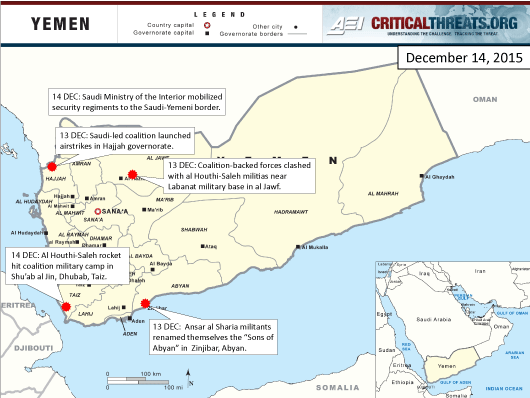The Yemen ceasefire began at 9:00 PM GMT on Monday, December 14, but it remains tenuous following an al Houthi-Saleh rocket attack on a coalition base in Taiz governorate. The breakdown of the ceasefire would likely derail the simultaneous UN-led peace process and further prolong the conflict in Yemen.
Al Houthi-Saleh forces fired a Tochka rocket at a coalition forward operating base in southwestern Taiz governorate, raising concerns for the stability of the ceasefire. The rocket, an OTR-21 (SS-21 Scarab), killed the commander of Saudi Special Forces in Yemen, Colonel Abdullah al Sahian, as well as an Emirati officer and dozens of Yemeni, Sudanese, Saudi, and Emirati troops on December 14. It is the most damaging al Houthi-Saleh attack since a September 4 Tochka rocket attack on a coalition base in Ma’rib that killed more than 60 coalition soldiers. The Saudi-led coalition followed through on its diplomatic commitment and initiated a seven-day renewable ceasefire at 12:00AM Sana’a time on December 15, while reserving the right to respond to any breach of the ceasefire. Previous ceasefire attempts in May and July broke down due to accusations of violations on both sides.
Saudi Arabia is escalating its response to al Houthi-Saleh aggression on the Saudi-Yemeni border. Pro-al Houthi Saba News’s claims that al Houthi-Saleh units launched missiles at Saudi Arabia’s King Khaled Airbase on December 13 and Jazan Regional Airport on December 14 are likely false, but ongoing cross-border attacks prompted Saudi forces to launch additional airstrikes, as well as possible heavy artillery attacks, throughout northern Yemen. Saba’s claims follow two weeks of escalating al Houthi-Saleh aggression near the Saudi-Yemeni border. The Saudi Ministry of the Interior reportedly mobilized four units specialized in mountain and guerilla warfare to the Saudi-Yemeni border, possibly indicating plans to engage al Houthi-Saleh forces along the border or, less likely, on the Yemeni side of the border.
Coalition-backed forces are seeking control of al Jawf governorate, which would secure positions in Ma’rib and place additional pressure on al Houthi-Saleh positions in northern Yemen. The coalition is pushing toward al Jawf’s regional capital, and coalition-backed forces clashed with al Houthi-Saleh militias near Labanat military base on December 13. Coalition airstrikes targeted military sites and equipment throughout al Jawf on the same day. Al Jawf borders the al Houthi stronghold of Sa’ada governorate, and an uptick in coalition activity there likely signals an attempt to gain a strategic advantage in northern Yemen before the anticipated ceasefire.
Al Qaeda in the Arabian Peninsula (AQAP) is both entrenching itself in Yemen and reaffirming its connection to al Qaeda’s global network. Locals in Zinjibar, the capital of Abyan governorate in southern Yemen, reported that fighters from AQAP’s militant arm, Ansar al Sharia, rebranded themselves as the “Sons of Abyan” on December 14. AQAP militants have used similar group names in the past to legitimize their governing role in the region. AQAP also released an audio speech from former Guantanamo detainee Ibrahim Ahmed Mahmoud al Qosi, calling for unity in jihad and praising the recent re-unification of al Qaeda in the Islamic Maghreb (AQIM) and al Murabitoun in Mali. (Transcript obtained through SITE.) Al Qosi also pledged allegiance to Afghan Taliban leader Mullah Akhtar Mansour, following the lead of al Qaeda leader Ayman al Zawahiri.
Al Houthi-Saleh forces’ escalation of attacks against Saudi Arabia and coalition positions challenges the Gulf states’ narrative of victory in Yemen. The Saudi-led coalition will remain entrenched in Yemen, regardless of the outcome of the UN-led talks. The requirement of a victory against the al Houthi-Saleh alliance continues to distract the coalition from the counter-terrorism fight in Yemen, allowing AQAP to strengthen its foothold in the country.

